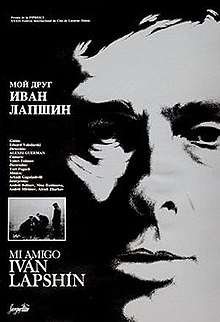My Friend Ivan Lapshin
My Friend Ivan Lapshin (Russian: Мой друг Иван Лапшин, romanized: Moy drug Ivan Lapshin) is a 1985 Soviet crime drama directed by Aleksei German and produced by Lenfilm, based on a novel by Yuri German adapted by Eduard Volodarsky. Music was composed by Arkadi Gagulashvili, sound by Nikolai Astakhov, cinematography by Valeri Fedosov, film editing by Leda Semyonova. It was narrated by Valeri Kuzin.
| My Friend Ivan Lapshin | |
|---|---|
 | |
| Directed by | Aleksei German |
| Produced by | Lenfilm |
| Screenplay by | Eduard Volodarsky |
| Based on | One Year by Yuri German |
| Starring | Andrei Boltnev Nina Ruslanova Andrei Mironov Aleksei Zharkov |
| Music by | Arkadi Gagulashvili |
| Cinematography | Valeri Fedosov |
| Edited by | Leda Semyonova |
Release date |
|
Running time | 100 minutes |
| Country | Soviet Union |
| Language | Russian |
Plot
Set in 1935 in the fictional provincial town of Unchansk (filmed in Astrakhan),[1] the film is presented as the recollections of a man who at the time was a nine-year-old boy living with his father in a communal flat shared with criminal police investigator Ivan Lapshin and a number of other characters. There are several plot strands: a provincial troupe of actors arrive and put on a play without much success; a friend of Lapshin's, the journalist Khanin, shows up, depressed after his wife's death; and Lapshin investigates the Solovyov gang of criminals. Lapshin falls in love with the actress Natasha Adashova, but she is in love with Khanin. It is "a film about people 'building socialism' on a bleak frozen plain, their town's one street a long straggle of low wooden buildings beneath a huge white sky, leading from the elegant stucco square by the river's quayside out into wilderness".
Reception
According to Tony Wood,
These are people whose faith in the future remains intact, but whose betrayal is imminent. German has said that his main aim was to convey a sense of the period, to depict as faithfully as possible the material conditions and human preoccupations of Soviet Russia on the eve of the Great Purge. It is for this world, for these people that the narrator struggles to declare his love—unconditional, knowing how flawed that world was, and how tainted the future would be. German compared the film to the work of Chekhov, and one can see in it a similar tenderness for the suffering and absurdity of its characters.[2]
Cast
- Andrei Boltnev as Ivan Lapshin
- Nina Ruslanova as Natasha Adashova
- Andrei Mironov as Khanin
- Aleksei Zharkov as Vasya Okoshkin
- Zinaida Adamovich as Patrikeyevna
- Aleksandr Filippenko as Zanadvorov
- Yuriy Kuznetsov as Superintendent
- Valeriy Filonov as Pobuzhinskiy
- Anatoli Slivnikov as Bychkov
- Andrei Dudarenko as Kashin
- Semyon Farada
- Nina Usatova
- Lidiya Volkova
- Yuri Aroyan
- Natalya Laburtseva
- Anna Nikolayeva
- Anatoli Shvedersky
- Vladimir Tochilin
- Boris Vojtsekhovsky
References
- Condee, Nancy (8 April 2009). "The Imperial Trace: Recent Russian Cinema". Oxford University Press – via Google Books.
- Tony Wood, "Time Unfrozen: The Films of Aleksei German," New Left Review 7, Jan.-Feb. 2001.